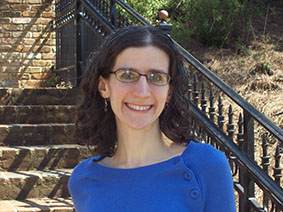
From the January 2014 Desktop News | Dr. Margaret Abruzzo, associate professor in the Department of History, was recently awarded a $50,400 grant from the National Endowment for the Humanities. Abruzzo will use the grant to spend the next year researching and writing her next book, tentatively titled, Good People and Bad Behavior: Changing Views of Sin, Evil, and Moral Responsibility in the 18th and 19th Centuries.
The book will trace changes in how both Catholic and Protestant Americans thought about sin and sinners. During the 18th and 19th centuries, many traditional frameworks for explaining sin—such as blaming it on passions, self-interest, or natural depravity—weakened, forcing people to develop new ways of explaining why “good” people behaved badly. Even while Americans denounced sin and evil—especially the wickedness of others—they also grew less likely to describe themselves as evildoers. This book will explore how Americans redefined both what it meant to be a good (or bad) person and who counted as a good person.
Abruzzo’s research has focused on the history of morality. Her first book, Polemical Pain: Slavery, Cruelty, and the Rise of Humanitarianism, analyzed the changing moral views of cruelty within the slavery debate. She became interested in how people understand themselves as “good” people, even when they were doing things that we would consider deeply morally wrong. This book project builds upon that interest.
NEH grants are highly competitive. In the last five competitions there were more than 1,200 applications per year. The program made an average of 88 awards per year, for a funding ratio of 7 percent.